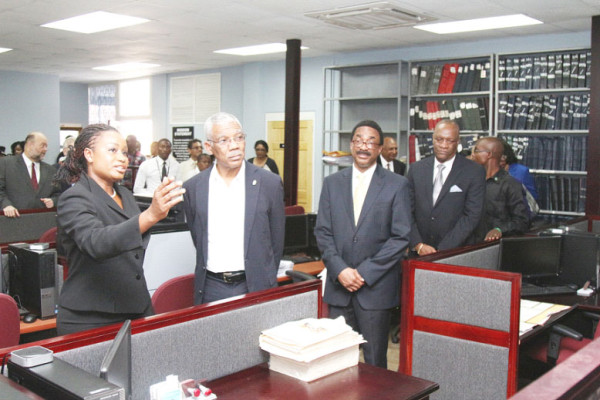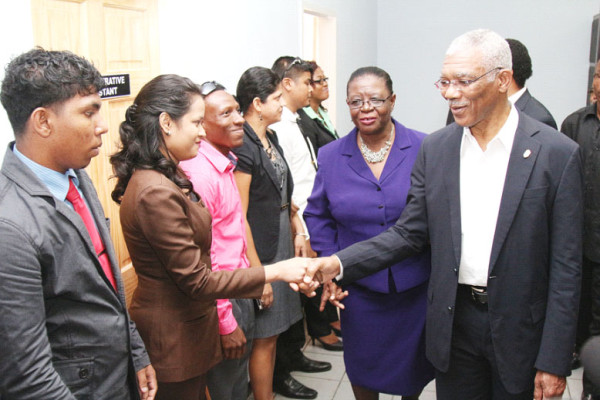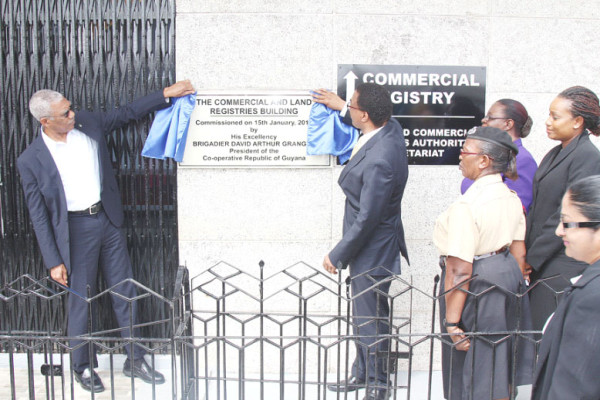The Commercial and Land registries must be fully computerised as part of a wider modernisation process to protect documents from flood, fire and tampering, according to President David Granger, who yesterday also called for updated copyright laws to protect the creative community.
“We are now in a modern era and the management of these two registries must aim at the complete computerisation of their entire systems…must be characterised by staff, staff that is educated, staff that is competent, staff that is honest and ‘unbribable,’” he said during the commissioning of the building which will accommodate the two registries.

The building, located on the Avenue of the Republic, was owned by the New Building Society (NBS) and formerly housed its headquarters. Through collaboration between the government and the Inter-American Development Bank (IDB), the prime piece of real estate was acquired at a cost of $770M and later renovated.
Granger, during his feature address, said that the commissioning of the building is another step towards “economic resilience.” He called it a new chapter in the administration’s quest for modern legal, administrative systems, characterised by efficiency and which would boost the economy and promote private enterprise.
Granger said the plan for greater economic independence “can only be achieved if we remove the impediments to investment and obstacles to other forms of economic exchange” and he added that the two registries are constituent elements of the country’s national, legal administrative architecture.
“They create and preserve the enforcement of property rights,” he said, while noting that land titling secures formal and legal property rights and the registration of business names and other related activity all support the creation and protection of property rights, particularly intellectual property rights.
“These two registries play an important role in the smooth functioning of markets by ensuring formal legal ownership, transfer and enforceability of property rights,” he said, while adding that the absence of these rights would distort the functioning of markets and serve as a disincentive to production, consumption, ex-change and the functioning of market economies. He stressed that property rights create order within an economic system. “The legal protection of property rights acts as a safeguard against arbitrary and capricious and sometimes criminal deprivation and dispossession of property,” he said.
According to Granger, the absence of property right puts the economic system at risk for chaos. “It would create an army of pirates, who would have no respect for law, no regard for the ownership rights of others…the state must protect property owners and property rights if there is to be orderly economic development,” he stressed.
Investors are more likely to invest where the protection of property rights exist, the president asserted.
Tedious

“Property rights, therefore, must be supported by a sound administrative system and that system must be characterised by service, service that is efficient and friendly because a tedious, slothful property rights system discourages investors, increases the cost of investment and reduces the volume and pace of economic activities,” he said.
“Our land and commercial laws must be updated to take account of the new forms of property rights. Our copyright laws must be modernised to provide protection to our producers, artists, artistes and publishers,” he added.
He told the gathering that Guyana must not fall further behind the rest of the world but catch up with the Caribbean and the South America continent.
Attorney General Basil Williams, in his remarks, said that the Commercial Registry, which is a significant contributor of revenue to the national budget, is part of the Deeds and Commercial Registry Authority established in 2013 and operationalised in 2014. He said that it remained on the ground floor of the High Court building until its move to the NBS building.
He said that it was recognised from early on that there was a need for them to have separate identities and that this is where the IDB came in. Williams said that in private practice, prior to his appointment as AG, he had a lot of dealings with the Deeds, Commercial and Land Registry. He said that there were complaints of a large backlog, which has now been remedied with the recent appointment of the Land Registrar. He noted that the mandate of the Commercial Registry is to ensure an adequate system for the administration of the laws related to trademarks, patents, designs, copyright, trade unions, businesses, companies, partnerships and business names.
It is very important, he said, that the Land Registry is situated where it now is as the location is more convenient and accessible to clerks and lawyers and will facilitate business, which is one of the aims of the government. Williams said that government wants to ensure that investors are not “restrained” and “hamstrung” by processes that would frustrate them and cause them to have second thoughts about investing in Guyana.
Go further

According to President of the Guyana Bar Association Christopher Ram, registries provide a vital role in the life of society as they are the “repository and guardian of legal documents, the facilitator and protector of public interest and generally responsible for the registration, maintenance and management of property records.”
He drew attention to recent media reports of questionable land transactions and stressed that these highlight the important of the registries. He recalled that the land registry was in the most cramped conditions in d’Urban Backlands for decades.
“An efficient office requires more than the physical space…I want to throw out this challenge to the Attorney General…he must ensure that the procedures used by the two registries (are) modernised and computerized,” he said.
He called on the Attorney General to do more, particularly ensuring that records are put online so that members of the public living in far-flung communities will have easier access to them, ensuring that time and money are saved. “Go further and make the systems amenable to online filing. Indeed, these two registries can show the way to the High Court and the Magistracy which themselves cry out for modernisation. Fifty years after independence, we are still using the rules of the Supreme Court we inherited from our colonial masters and that is not acceptable,” he noted.
IDB Representative Sophie Makonnen said that the project was part of a set of comprehensive reforms aimed at enhancing Guyana’s competitiveness and contributing to increased levels of private investment and exports. She said that this is to be done through the strengthening of the institutions for public/private dialogue and competitiveness and improvement of the business environment.
Makonnen said that the registries will provide impetus for higher levels of investment in commerce, economic growth and employment generation. The commercial community, she posited, has come to expect transactions to be registered and be made operational quickly, firmly and at a reasonable cost. “The commissioning of this building is significant to the changing demands of the commercial architecture across Guyana,” she added.
Norman McLean, Chairman of the Private Sector Commission (PSC), said that the acquisition of the building must lead to the realisation of the role and mission of the registries so that there is an expectation of better results in the future. He said that with the growth of businesses in Guyana, there is the need to make the unit more sustainable and efficient. He added that this required “political will, dedicated resources and an impartial board or directors….committed staff and the issue of modernity.” He said that it is important that the registries work along with the PSC to encourage intellectual property development and protection, while noting that they are the “protector of property rights” and businesses need such a system to protect manufacturing secrets and other useful information to remain ahead of the competition.





